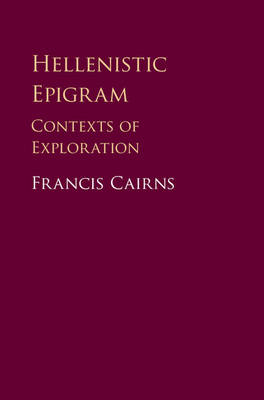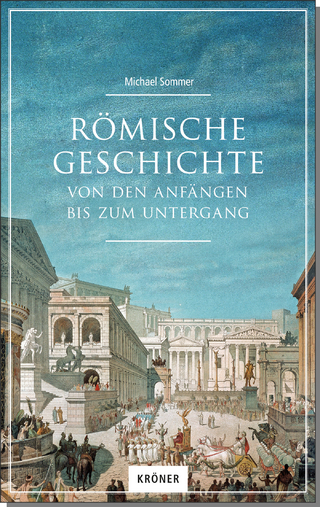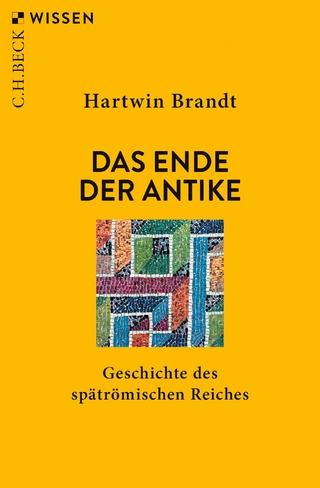
Hellenistic Epigram
Cambridge University Press (Verlag)
978-1-107-16850-3 (ISBN)
This book offers scholars and students of Hellenistic and Roman literature an overview of Hellenistic epigram, a field closely related to other Hellenistic poetry and highly influential upon Roman poetry. In fourteen themed chapters, it foregrounds the literary, linguistic, historical, epigraphic, social, political, ethnic, cultic, onomastic, local, topographical and patronage contexts within which Hellenistic epigrams were composed. Many epigrams are analysed in detail and new interpretations of them proposed. Throughout, the question is asked whether epigrams are literary jeux d'esprit (as is often assumed without proper discussion) or whether they relate to real people and real events and have a function in the real world. That function may be epigraphic, for example an epigram can be the epitymbion for inscription at someone's grave, or the anathematikon for inscription on or beside a dedicated object, or a picture-label - an ekphrasis to accompany a painting or mosaic.
Francis Cairns held the Chairs of Latin at the University of Liverpool and of Latin Language and Literature at the University of Leeds before moving in 2000 to his present position as Professor of Classical Languages at Florida State University. His earlier books are Generic Composition in Greek and Roman Poetry (1972), Tibullus: A Hellenistic Poet at Rome (Cambridge, 1979), Virgil's Augustan Epic (Cambridge, 1989), Sextus Propertius: The Augustan Elegist (Cambridge, 2006), Papers on Roman Elegy (1969–2003) (2007) and Roman Lyric (2012).
Preface; Abbreviations; Part I. Introductory: Contexts and their Loss: 1. Audience context and circulation context; 2. Epigraphic context; 3. The state of the text; Part II. Afterlives: 4. Optimism; 5. Consolation; 6. Pessimism?; 7. Shipwrecks; Part III. Philosophical Matters: 8. Over-philosophical interpretations (Callimachus, Asclepiades, Posidippus); 9. Philosophical superficiality (Leonidas); 10. Meleager and philosophy; 11. Philodemus; Part IV. Temples and Shrines: 12. A shrine of the Great Mother; 13. Apollo's deer at Kourion; 14. Paphian Aphrodite; Part V. Literary Polemics: 15. Posidippus; 16. Asclepiades on Lyde; 17. Further Hellenistic literary programmes; 18. Antipater of Sidon; 19. Epigrams about Erinna; Part VI. Literary Polemics Continue: 20. Telchines and grammarians; 21. Polemic pro/anti epic?; Part VII. Poetry, Sex, the Countryside: 22. Poetry and sex; 23. Country matters; Part VIII. Medical Connections: 24. Medicine in non-epigrammatic Hellenistic poetry; 25. Medicine in epigram; Part IX. Epitaphs: Epigraphic or Epideictic?: 26. Death caused by wine; 27. Deaths while drunk; 28. Deaths of drunken old women; 29. Cenotaphic epitymbia; Part X. Local Interests: 30. Archaizing language: Anyte and Nicias; 31. Dialects; 32. Local customs: hair dedications; 33. Historical claims: the Thyreatis; Part XI. Speakers, Addressees, Antecedents: 34. Geese taken for swans; 35. Speakers and addressees in archaic inscribed epigrams; 36. Epitymbic speakers and addressees; 37. Unsafe assumptions of originality; 38. Over-interpretations of Hellenistic epigrams; Part XII. The Erotic: 39. Novelty in the erotic komos; 40. Legalism; 41. 'Enrichment' and emotion; 42. Cynical attitudes and mercenary motives; 43. Meleager and mosquitoes; Part XIII. Generic Innovation: 44. Implicit dialogue; 45. Explicit dialogue; 46. Initial generic deception; 47. Epigraphic genres in amatory epigrams; 48. Function as context; 49. Multiple addressees; Part XIV. Learning: 50. Philological; 51. Technical; 52. Metrical; 53. Mythography and local culture; Bibliography; Index locorum; Index anthologiae graecae; Index of personal names in epigrams; General index.
| Erscheinungsdatum | 07.09.2016 |
|---|---|
| Verlagsort | Cambridge |
| Sprache | englisch |
| Maße | 160 x 235 mm |
| Gewicht | 890 g |
| Themenwelt | Geschichte ► Allgemeine Geschichte ► Altertum / Antike |
| ISBN-10 | 1-107-16850-3 / 1107168503 |
| ISBN-13 | 978-1-107-16850-3 / 9781107168503 |
| Zustand | Neuware |
| Haben Sie eine Frage zum Produkt? |
aus dem Bereich


